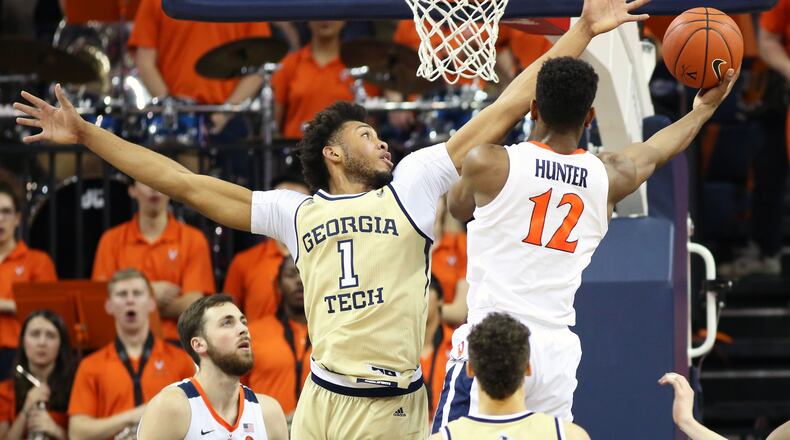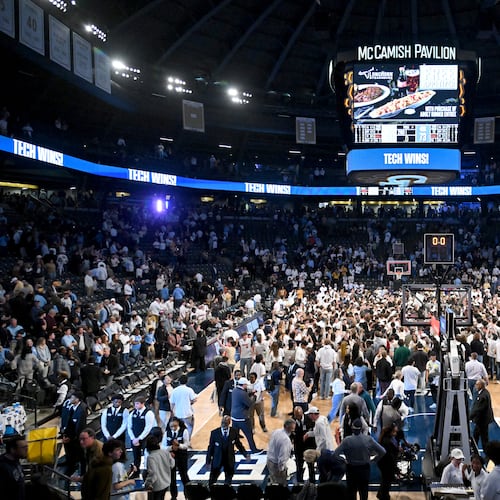Georgia Tech coach Josh Pastner and his staff have six more months to prepare the Yellow Jackets for the 2019-20 season. But, in the middle of May, Pastner has opportunities on two fronts to directly impact the course of his fourth season and Tech’s hopes of making the NCAA tournament for the first time since 2010.
One is his continued recruitment of a post player to back up center James Banks. The other is the completion of the non-conference schedule.
Of the former, Pastner and Tech would be in a bind without a true post player to sub for Banks. Simply from a depth standpoint, having only one center on the roster would be a risky proposition.
Further, not having a comparable player to put in the lineup if Banks is out of the game or injured complicates matters. The Princeton-style offense that the Yellow Jackets have used in Pastner’s first three seasons revolves around a post player stationed at the top of the lane.
“We are searching and fighting for a big,” Pastner told the Atlanta Journal-Constitution.
Without a post player, Tech would have to shift its style of play, likely moving to a “five-out” system in which the five players space the floor on the perimeter. On defense, without Banks – named to the ACC all-defensive team – Pastner could try Moses Wright to defend the post, but there’s a potential for mismatches.
“If we don’t sign another big, we’ve got to do it by committee,” Pastner said. “We’ve got to look guys like (David) Didenko, Evan (Cole), Moses because of how we play.”
Cole and Wright don’t have much experience playing out of the post, and Didenko is coming to Tech after one season in junior college.
Tech may benefit from a fortuitous turn. Wednesday, Ole Miss signee Rodney Howard, a center from Roswell and Legacy Charter School in Greenville, S.C., asked for his release from his letter of intent. Howard, rated the No. 42 center in the class (247Sports Composite), has an unofficial visit scheduled for Tech on May 25. Competition for Howard, though, will be fierce.
Other options are running thin. Yvan Ouedraogo, a power forward from France whom Tech was recruiting, committed to Nebraska on Sunday.
“We are globally looking for bigs,” Pastner said.
Tech has one scholarship remaining for the 2019-20 academic year. Pastner said he would keep recruiting until mid-June. Unless he secures a post player or another player “that I just couldn’t say no to,” he would pocket the scholarship and use it for the 2020 class.
Pastner also has two more non-conference games to schedule, which could be a factor in Tech’s pursuit of an NCAA tournament berth, an effort that gained strength with the addition of VMI transfer Bubba Parham, presuming he will receive a waiver to play immediately.
It’s in Tech’s interest to be able to present a strong non-conference schedule to the NCAA selection committee, as non-conference strength of schedule often is a factor in separating potential tournament teams.
This past season, Tech’s strength-of-schedule rating outside of ACC play was 258 (RPI). The power-conference team with the lowest SOS rating to get an at-large bid for the NCAA tournament was Iowa at 160.
Tech’s non-conference schedule last season was a mix – four power-conference teams and two more NCAA tournament qualifiers, but also six teams with NET ratings (the replacement for RPI) that were 200 or lower and three that were 300 or lower.
Thus far, for non-conference games, Tech will be at home against Arkansas, Ball State, Delaware State and Elon and on the road at Georgia. The Jackets will play in the ACC/Big Ten Challenge, likely at home.
They’ll also go to Hawaii for three games in the Diamond Head Classic, which will help from an SOS perspective as they’ll be neutral-site games, although the field doesn’t appear particularly strong.
That’s three power-conference teams and possibly a fourth (Washington is in the Diamond Head field). Elon and Delaware State were both below 200 in NET ranking. For the sake of the NCAA tournament résumé, Tech might do well to line up stronger opponents with its final two non-conference games.
Recognizing that non-conference strength of schedule is a factor, Pastner said he and the staff are looking for the games that he believes will help Tech’s tournament chances the most.
Pastner is focused on three factors that the selection committee weighs – record against “quad 1” opponents (home games against teams with NET ratings 1-30, neutral-site games against teams 1-50 and road games 1-75), quad-2 opponents (31-75 home, 51-100 neutral-site, 76-135 road) and non-conference strength of schedule.
“When it’s all said and done, when we’re done with our 31-game schedule, I do believe our non-conference strength of schedule will be stronger than it was this previous year,” he said.
There are multiple layers that he and his staff have to navigate, though. Pastner said he has been told that Tech will have two open dates during the ACC schedule, one more than usual, but hasn’t yet been told when those holes in the schedule are.
In the meantime, the staff is trying to decide how to use those openings, whether to rest or to play non-conference games. Pastner usually has tried to find non-conference games to fill in the schedule to keep the team’s rhythm.
The opponent in the ACC/Big Tec Challenge is not yet known, nor the location of the game.
“It’s not like, let’s go play Team A at home,” he said. “It doesn’t work like that.”
About the Author
Keep Reading
The Latest
Featured



